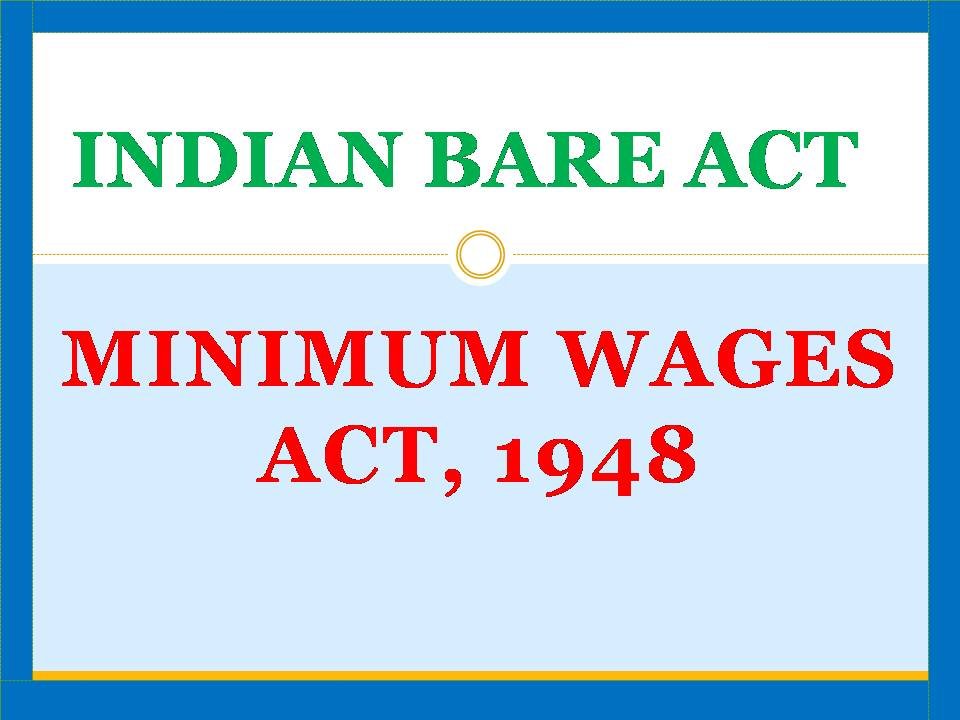Minimum Wages Act, 1948: Object, Constitutional Validity and Salient features
Minimum Wages Act 1948 came into force in India when India had recently gained its freedom. Labor laws made by the Britishers were exploitative in nature. Wages were low and different in every part of the country. That time there was no such thing as “Minimum Wages” which seems quite bad for worker section. It came to bring equality and justice to the blue-collar people.
As, workers of India with a high rate of unemployment can be exploited by the employers because of their existing low bargaining power. In such circumstance, workers are not getting enough amount of expected wage to meet their basic or daily needs.
In view of this fact, Legislature and Parliament stepped in to control the excess of employer by enacting Minimum Wages Act in the year 1948. The primary intention behind this Act was to fill the gap of wages amount between different sector of employments. This Act fixes the minimum rates of wage in certain employments.[i] That is, the wage paid for the work done should not be lesser than the amount suggested by the Act.[ii]
The reasoning behind the enactment of Act is to entitle the Central Government and State Governments to fix minimum wages amount in certain employments so as to prevent the exploitation of the labor class which is usually did by the capitalist class. As per the Act, Government has to take the steps to fix the minimum wage rates and revise the same at the interval of every five years. Also, it has the power to appoint advisory committees to provide just representation of the employers as well as employees.
Objective:
- To safeguard that the employee has a basic physical necessity, proper health, and comfort.
- To provide for fixation of minimum wages in scheduled employments and Ensure that the labor gets fair wages.
- To revise the minimum wage amount periodically.
- To reduce the chances of workers getting expoited in the hands of their employers.
The significance of the Minimum Wages Act, 1948 in the context of conditions in India has been explained by the Supreme Court in Unichoyi v. State of Kerala[iii], as follows:
“What the Minimum Wages Act purports to achieve is to prevent exploitation of labour and for that purpose empowers the appropriate Government to take steps to prescribe minimum rates of wages in the scheduled industries. In an underdeveloped country which faces the problem of unemployment on a very large scale, it is not unlikely that labour may offer to work even on starvation wages. The policy of the Act is to prevent the employment of such poor labour in the interest of general public and so in prescribing the minimum rates, there is no need to consider the capacity of employer What is being prescribed is minimum wage rates which a welfare State assumes every employer must pay before he employs labour.”[iv]
Constitutional Validity of Act:
The Minimum Wages Act, 1948 giving both the Central government and State government jurisdiction in fixing wages. The act is legally non-binding but statutory. If Wage amount is paid less than fixed minimum wage rate amount to forced labour. Constitute the Wage Board for analyze the capacity of employer to pay and fix such amount of wage that they at least cover a family’s basic need.
Also Read What is the procedure of penalties under the Factories Act 1948
But on some grounds, the constitutional validity of this Act was challenged. It was said that as the above Act violates Article 14 and 19(1)(g) of the Indian Constitution.
The constitutional validity of this Act was challenged in the case Bijay Cotton Mills Ltd v.The State of Ajmer[v] on the ground that it violates the guarantee of freedon of trade and business, etc. envisaged by Article 19(1)(g). It was held that, the restrictions imposed upon the freedom of contract by the fixation of minimum rates of wages though they interfere this Article19(1)(g) in some extent but this is not unreasonable. It imposed in the interest of general public and with a view to carry out one of the Directive Principle of State Policy as imbodied in Article 43 which talks about living wages in the Constitution are protected by th terms of clause (6) of Article 19.
The same judgment given in other case named,Shamrao v. State of Bombay[vi]. Another important judgment that favours and supports the constitutionality of the Minimum Wages Act, 1948 is, V. Unichonoy v. State of Kerala[vii] held that “ Fixation of minimum wages is for preservation of public order, and if no minimum wage is fixed then it shall lead to arbitrariness by the employers and that shall lead to the matter of dispute between employer and labour which shall cause friction in society”.
The article 14 of the Indian Constitution which states equality before the law, it must be noted that minimum wages are not fixed equally across the whole nation but they vary according from occupation to occupation and industry to industry and from place to place.[viii]
“On a careful examination of the various Acts and the machinery set up by this Act, Section 3(3)(iv) neither contravene Article 19(1) of the constitution nor does it violate the equal protection clause of the constitution. The Courts also held that the constitution of the committees and the Advisory Wage Board did not contravene the statutory provisions in that behalf prescribed by the legislature”[ix],- this was held in the case of ‘Bhikusa Yamasa Kshatriya v. Sangamner Akola Bidi Kamgar Union“[x]
Referring the another case: N.M.Wadia Charitable Hospital v. State of Maharashtra[xi], held that “Fixing different minimum wages for different localities is permitted under the constitution and under labor laws, hence the question that any provision of the Minimum Wages Act is in any way against the provision of constitution is wrong.”
In Sanjit Roy v. State of Rajasthan (1983)[xii], the Supreme Court held that “the Exemption Act in so far as it excluded the applicability of the Minimum Wages Act 1948 to the workmen employed in famine relief work is “clearly violative” of Article 23. Thus even public works ostensibly initiated by the government for the sole purpose of providing employment are subject to the Minimum Wage Act.”
Salient Features:
- This Act applied to certain employments and it empower both Central and State government to fix amount of wage for their respective areas.
- Minimum wage means all remuneration in should be paid in cash.
- Fixing of Minimum wages on the basis of :
(a) a minimum time rate,
(b) a minimum piece rate,
(c) a guaranteed time rate,
(d) a time rate or a piece rate applicable to overtime rate.[xiii]
- Fixing minimum rates of wages according to the class of :
(a) different scheduled employments;
(b) different classes of work in the same scheduled employment;
(c) adults, adolescents, children and apprentices; and
(d) different localities (zone wise).[xiv]
- Minimum wages revised by appropriate government in every 5 years.
- In contravention of this Act by not paying minimum wage a claim can be made under section 20 of aforesaid Act.
- Non payment of Minimum wages is an offence punishable up to six months imprisonment or with fine up to Rs. 500 or with both.
Conclusion:
The Minimum Wages Act, 1948 was set up with the aim of providing atleast minimum wages to the workers. This Act was formed to provide social justice and living wages. Even in the preamble of this Act said “To provide for fixing minimum rates of wages in certain employments.”Although to some extent it can be said that aforesaid Act contravenes with the fundamental rights provided by the Indian Constitution but even the fundamental rights imposes some restriction with respect to public interest, morality and public order.Accordingly, this Act is constitutionally valid.
Reference
- [i] Minimum Wages Act, 1948
- [ii] https://www.taxmann.com/blogpost/2000001861/minimum-wages-act-1948.aspx
- [iii] (A.I.R. 1962 SC 12)
- [iv] https://www.legalbites.in/law-notes-object-validity-features-minimum-wages-act-1948/
- [v] 1955 AIR 33
- [vi] AIR 1962 Bom 97
- [vii] 1962, SC 12
- [viii] http://www.legalservicesindia.com/article/1770/The-Constitutional-Validity-of-The-Minimum-Wages-Act,1948.html
- [ix] ibid
- [x] AIR 1963 SC 306
- [xi] 1993 IIILLJ 536 Bom
- [xii] 1983 AIR 328
- [xiii][xiii] Minimum wage Act, 1948
- [xiv] ibid
Also Read:




![Tax Law Internship Opportunity at Legum Attorney [Chamber of Ashish Panday], Delhi [Tax Litigation]: Apply by 2nd November](https://www.ourlegalworld.com/wp-content/uploads/2024/10/Legum-Attorney-Intern.png)



